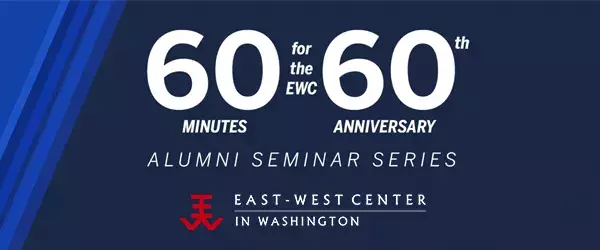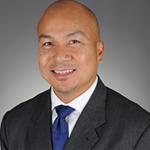Error message

OFFICE/DEPARTMENT
The East-West Center in Washington invites you to the
60 Minutes for the EWC 60th Anniversary Alumni Seminar Series:
Getting the Balance Right:
Southeast Asia in the Shadow of Sino-US Rivalry
Featuring:
Dr. Joseph Chinyong Liow
(EWCW Southeast Asia Visiting Fellow, 2005)
Tan Kah Kee Chair Professor in Comparative and International Politics and Dean, College of Humanities, Arts, and Social Sciences,
Research Advisor and former Dean, S. Rajaratnam School of International Studies,
Nanyang Technological University
Dr. Satu P. Limaye (Moderator)
Vice President, East-West Center &
Director, East West Center in Washington
As Sino-US competition and rivalry gathers disconcerting pace, the states of Southeast Asia increasingly find themselves in the uneasy position of having to make

choices even as they stand at what Henry Kissinger calls the “foothills of Cold War”. This is reflected in the growing discourse - on the emergence of a new Cold War and the choices confronting the region - that have come to shape regional discussions. What are some of the assumptions that frame this discussion, and what are the implications that flow from them? This talk unpacked some of these assumptions behind the discussion on choices, and to assess the policy options that are available for the states of Southeast Asia in the shadow of the dark clouds that evidently lie ahead.
This year marks the 60th anniversary of the East-West Center and its mission to promote better relations and understanding among the people and nations of the United States, Asia, and the Pacific through cooperative study, research, and dialogue. The East-West Center in Washington (EWCW)’s 60 Minutes for the EWC 60th Anniversary Alumni Seminar Series highlights the work of EWCW alumni/ae who have participated in our fellowship, publication, dialogue, and conference programs.
Joseph Chinyong Liow is Tan Kah Kee Chair in Comparative and International Politics at Nanyang Technological University (NTU), Singapore. He is Professor and former Dean at the S. Rajaratnam School of International Studies, and currently Dean of College of Humanities, Arts, and Social Sciences at NTU Singapore. He held the inaugural Lee Kuan Yew Chair in Southeast Asia Studies at the Brookings Institution, Washington DC, where he was also a Senior Fellow in the Foreign Policy Program. Joseph’s research interests encompass Muslim politics and social movements in Southeast Asia and the geopolitics and geoeconomics of the Asia Pacific region. Joseph is the author, co-author, or editor of 14 books. His most recent single-authored books are Ambivalent Engagement: The United States and Regional Security in Southeast Asia after the Cold War (Brookings 2017), Religion and Nationalism in Southeast Asia (Cambridge University Press, 2016) and Dictionary of the Modern Politics of Southeast Asia, fourth edition (Routledge, 2014). A regular columnist for The Straits Times, his commentaries on international affairs have also appeared in New York Times, Foreign Affairs, Foreign Policy, National Interest, Nikkei Asian Review, and the Wall Street Journal. He has testified to the United States Congress, and been invited to deliver a special closed-door briefing to the ASEAN Defence Minister’s Meeting. In addition to scholarship and policy analysis, Joseph has also consulted for a wide-range of MNCs including Shell, BHP Billiton, Chevron, Japan Bank for International Cooperation, Total, and Statoil. He sits on the board of several peer-reviewed academic and policy journals, is a member of the Social Science Research Council (Singapore), and serves as Singapore’s representative on the advisory board of the ASEAN Institute of Peace and Reconciliation formed under the auspices of the ASEAN Charter. Joseph Liow holds a PhD in International Relations from the London School of Economics and Political Science, a MSc in Strategic Studies from the Nanyang Technological University, and a BA (Hons) in Political Science from the University of Madison-Wisconsin.
Satu Limaye is Vice President of the East-West Center and the Director of the East-West Center in Washington where he created and now directs the Asia Matters for America initiative and is the founding editor of the Asia Pacific Bulletin. He is also a Senior Advisor at CNA Corp (Center for Naval Analyses) and Senior Fellow on Asia History and Policy at the Foreign Policy Institute at Paul H. Nitze School of International Studies (SAIS). He is a graduate of Georgetown University and received his doctorate from Oxford University (Magdalen College) where he was a George C. Marshall Scholar. Recent publications include: “America’s ‘Pacific Principle’ in an Indivisible Pacific Islands Region,” (Asia-Pacific Bulletin); “Despite Stumbles, America’s Engagement with Southeast Runs Deep,” (Global Asia); Raging Waters: China, India, Bangladesh, and Brahmaputra Water Politics (Marine Corps University Press); and Russia’s Peripheral Relevance to US-Indo Pacific Relations (Center for the National Interest).
The East-West Center in Washington invites you to the
60 Minutes for the EWC 60th Anniversary Alumni Seminar Series:
Getting the Balance Right:
Southeast Asia in the Shadow of Sino-US Rivalry
Featuring:
Dr. Joseph Chinyong Liow
(EWCW Southeast Asia Visiting Fellow, 2005)
Tan Kah Kee Chair Professor in Comparative and International Politics and Dean, College of Humanities, Arts, and Social Sciences,
Research Advisor and former Dean, S. Rajaratnam School of International Studies,
Nanyang Technological University
Dr. Satu P. Limaye (Moderator)
Vice President, East-West Center &
Director, East West Center in Washington
As Sino-US competition and rivalry gathers disconcerting pace, the states of Southeast Asia increasingly find themselves in the uneasy position of having to make

choices even as they stand at what Henry Kissinger calls the “foothills of Cold War”. This is reflected in the growing discourse - on the emergence of a new Cold War and the choices confronting the region - that have come to shape regional discussions. What are some of the assumptions that frame this discussion, and what are the implications that flow from them? This talk unpacked some of these assumptions behind the discussion on choices, and to assess the policy options that are available for the states of Southeast Asia in the shadow of the dark clouds that evidently lie ahead.
This year marks the 60th anniversary of the East-West Center and its mission to promote better relations and understanding among the people and nations of the United States, Asia, and the Pacific through cooperative study, research, and dialogue. The East-West Center in Washington (EWCW)’s 60 Minutes for the EWC 60th Anniversary Alumni Seminar Series highlights the work of EWCW alumni/ae who have participated in our fellowship, publication, dialogue, and conference programs.
Joseph Chinyong Liow is Tan Kah Kee Chair in Comparative and International Politics at Nanyang Technological University (NTU), Singapore. He is Professor and former Dean at the S. Rajaratnam School of International Studies, and currently Dean of College of Humanities, Arts, and Social Sciences at NTU Singapore. He held the inaugural Lee Kuan Yew Chair in Southeast Asia Studies at the Brookings Institution, Washington DC, where he was also a Senior Fellow in the Foreign Policy Program. Joseph’s research interests encompass Muslim politics and social movements in Southeast Asia and the geopolitics and geoeconomics of the Asia Pacific region. Joseph is the author, co-author, or editor of 14 books. His most recent single-authored books are Ambivalent Engagement: The United States and Regional Security in Southeast Asia after the Cold War (Brookings 2017), Religion and Nationalism in Southeast Asia (Cambridge University Press, 2016) and Dictionary of the Modern Politics of Southeast Asia, fourth edition (Routledge, 2014). A regular columnist for The Straits Times, his commentaries on international affairs have also appeared in New York Times, Foreign Affairs, Foreign Policy, National Interest, Nikkei Asian Review, and the Wall Street Journal. He has testified to the United States Congress, and been invited to deliver a special closed-door briefing to the ASEAN Defence Minister’s Meeting. In addition to scholarship and policy analysis, Joseph has also consulted for a wide-range of MNCs including Shell, BHP Billiton, Chevron, Japan Bank for International Cooperation, Total, and Statoil. He sits on the board of several peer-reviewed academic and policy journals, is a member of the Social Science Research Council (Singapore), and serves as Singapore’s representative on the advisory board of the ASEAN Institute of Peace and Reconciliation formed under the auspices of the ASEAN Charter. Joseph Liow holds a PhD in International Relations from the London School of Economics and Political Science, a MSc in Strategic Studies from the Nanyang Technological University, and a BA (Hons) in Political Science from the University of Madison-Wisconsin.
Satu Limaye is Vice President of the East-West Center and the Director of the East-West Center in Washington where he created and now directs the Asia Matters for America initiative and is the founding editor of the Asia Pacific Bulletin. He is also a Senior Advisor at CNA Corp (Center for Naval Analyses) and Senior Fellow on Asia History and Policy at the Foreign Policy Institute at Paul H. Nitze School of International Studies (SAIS). He is a graduate of Georgetown University and received his doctorate from Oxford University (Magdalen College) where he was a George C. Marshall Scholar. Recent publications include: “America’s ‘Pacific Principle’ in an Indivisible Pacific Islands Region,” (Asia-Pacific Bulletin); “Despite Stumbles, America’s Engagement with Southeast Runs Deep,” (Global Asia); Raging Waters: China, India, Bangladesh, and Brahmaputra Water Politics (Marine Corps University Press); and Russia’s Peripheral Relevance to US-Indo Pacific Relations (Center for the National Interest).








